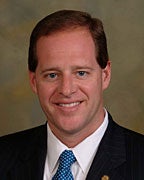Ward, Hill strengthening ‘gutted’ Alabama Open Meetings Act
Published 2:45 pm Thursday, February 13, 2014
By NEAL WAGNER / Managing Editor
A bill sponsored by state Sen. Cam Ward, R-Alabaster, aimed at strengthening Alabama’s Open Meetings Act is progressing in the state Legislature after Ward said a trio of Supreme Court cases “gutted” the law in recent years.
The Ward-sponsored Senate Bill 191 passed out of the Senate Judiciary Committee – of which Ward is the chairman – on Feb. 12, and will now move on to full Senate consideration.
The corresponding state House of Representatives bill, House Bill 244, was sponsored by Rep. Mike Hill, R-Columbiana, and currently is pending action by the House Committee on Ethics and Finance.
In a Feb. 11 interview, Ward said three recent Supreme Court cases have “effectively gutted” Alabama’s 2005 Open Meeting Act, which currently is in effect.
If passed, Ward said the new Open Meeting Act will forbid “serial meetings,” in which members of government entities meet in small groups without proper public notice in an effort to avoid establishing a quorum.
“In the case of those serial meetings, the public misses out on the discussion portion of the issue,” Ward said. “All they see is the final vote.”
“Meeting one-on-one to avoid discussing public business in public was never intended to be an acceptable practice under the Open Meetings Law, except where expressly permitted,” Hill wrote in a press release. “I was a co-sponsor of the rewrite of our Open Meetings Law in 2005, and as is the case with most comprehensive laws, some areas need to be better defined and clarified. That is my goal with this new legislation.”
The new Open Meeting Act also would provide basis for Alabama citizens to sue a government body for violations to the Open Meeting Act, something Ward said currently is “almost impossible.”
The new act also would forbid the Alabama Legislature from holding closed meetings without holding a public vote declaring secrecy is required for the situation at hand.
“The last Supreme Court case said the Legislature can hold private meetings,” Ward said. “That contradicts the state constitution, which says the Legislature must keep the doors open when its meets.”











